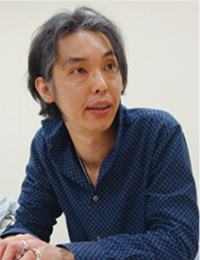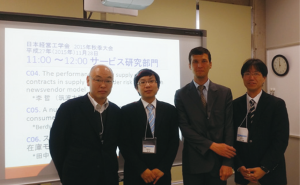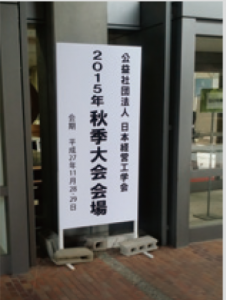キーワード: サービス組織、戦略経営、IT、顧客の組織化、業績評価

前代表 生稲 文彦先生
経済社会のサービス化が進み、先進国においては、70%以上の雇用や付加価値がサービス分野で生み出されるようになってきています。にもかかわらず、世界的に見て、サービス提供を本業とする経営組織体(サービス組織)がいかに生成し、いかに成長し、いかに成功・失敗するのかについての実証的研究は、散発的で不十分です。そこで、サービス組織の経営組織体の生成・成長・成功メカニズムについて、戦略、組織、IT、顧客の組織化、業績評価という5つの焦点から実証的に研究を行っているのが、「サービス組織の経営学」リサーチユニットです。
いいものを作っても、なぜ報われないのか

図1:倉田久先生 日本経営工学会 秋季大会(2015年11月28日~ 29日、於:金沢工業大学
1980 ~ 90年代、日本は自動車や家電などを欧米へ輸出し、世界第2位の経済大国になりました。しかし、経済社会のサービス化が進んだ現代は、良い製品を大量に作るだけでは高い経済成長することが難しい状況です。つまり、「いいものをつくっても報われない」現状です。この現状に対して、多くの経営学者が実証研究を進め、原因を理解し、解決の手がかりを得ようとしています。そうした研究を踏まえつつ、このリサーチユニットでは、製造業的に理解できる現象だけではなく、「サービス」という現象を正面から捉えた研究を進めています。なかでも関心を寄せているのは、戦略を実現する組織形態、人ならではの良さを生かした企業活動および公共政策の在り方、そして、そもそもサービスとはなにかといった問いです。これらについて、現場で働く人へのインタビュー、行動観察、データ解析、行動シミュレーション等の手法を用いつつ社会科学としての理論構築を試みています(図1)。
お客さんが気持ちよく協力してくれなければ成立しないのがサービス組織
標準的な過程(プロセス)を経て成果(アウトプット)を生み出すだけであれば、製造業の工場で行われている経営とほとんど変わらないのですが、今われわれが取り組みたいと思っていることは、標準的な活動と標準的でない活動を組み合わせて如何に組織体の経営を成立させるのかという課題です。工場ではお客さんが関わることなく物が作られますが、サービス提供の現場では、お客さんに関わってもらわなければ活動が成立しない。したがって、お客さんに気持ちよく振る舞ってもらう仕組みを作っていくことが重要になります。気持ちよく振る舞ってもらうためには、「とくに自分のために工夫されている」とお客さんが思うような標準的ではない活動が必要なのです。一方で、企業として利益をあげるためには、活動の過程を業務として標準化し、効率を上げなければいけない。それゆえ、活動の標準化を進めつつ、人に裁量を与えて標準的ではない活動を担ってもらう。この舵取りがサービス組織の経営にとって非常にチャレンジングな課題だと考えています。
社会への貢献・実績

図2:公益社団法人 日本経営工学会 2015 年 秋季大会
●「 営業を科学する」プロジェクト
(ソフトブレーン・サービス株式会社との共同研究)
● ファミリーレストランにおける顧客要求の探索研究
(株式会社サイゼリヤとの共同研究)
● 夕食食材宅配サービスにおける価値共創の実証研究
(ヨシケイグループとの共同研究)
● 文化庁の「アニメミライ」を題材にした政策研究(図2)
取材:平成27年3月23日
Analyses of corporate activities and trends in society to thoroughly discuss business management
Unit name: Management of Service Organizations
Key words: service organizations, strategic management, IT, organization of customers, performance evaluation
 As an increasing number of services are provided in society, more than 70% of employment contracts and added values are agreed or created in the service industry in developed countries. However, only sporadic and incomplete empirical studies have been conducted to examine: how management (service) organizations involved in the provision of services are established, and how they grow and achieve success or fail. The research unit: “Management of Service Organizations” conducts empirical research to examine the mechanisms of the establishment, growth, and success of the management bodies of service organizations, focusing on the following five points: strategies, organizations, IT, organized customers, and performance evaluation.
As an increasing number of services are provided in society, more than 70% of employment contracts and added values are agreed or created in the service industry in developed countries. However, only sporadic and incomplete empirical studies have been conducted to examine: how management (service) organizations involved in the provision of services are established, and how they grow and achieve success or fail. The research unit: “Management of Service Organizations” conducts empirical research to examine the mechanisms of the establishment, growth, and success of the management bodies of service organizations, focusing on the following five points: strategies, organizations, IT, organized customers, and performance evaluation.
Why does the manufacturing of high-quality products not pay off?

Figure 1: Professor Hisashi Kurata at the Autumn Conference of the Japan Industrial Management Association (held in the Kanazawa Institute of Technology on November 28 and 29, 2015)
In the 1980s through to 1990s, Japan exported automobiles and home electrical appliances to western countries, and became the world’s second-largest economy. However, in modern economic society focused on the service industry, it is difficult to promote economic growth solely by manufacturing large quantities of high-quality products. In other words, the “production of high-quality products” does not pay off in recent years. Many researchers specializing in business have been conducting empirical studies of the current situation to identify causes and clues for solutions. The research unit conducts research to thoroughly examine “services” as phenomena, in addition to discussing phenomena that occur in the manufacturing industry. We are particularly interested in the forms of organizations to implement strategies, human-oriented corporate activities and ideal public policies, and the basic question: “What are services?”. Members of the unit aim to establish social scientific theories in relation to the above-mentioned subjects, using various approaches: interviews with employees, behavioral observation, data analyses, and behavioral simulations (Figure 1).
Customers’ cooperation is essential for service organizations
We aim to go beyond producing outputs through a standard process as manufacturing plants do in their management activities. We take on the challenge of integrating standard and non-standard activities to help conduct organizational management. Whereas production in plants does not involve customers, the provision of services cannot be implemented unless customers are involved in it. Therefore, it is necessary for a company to develop systems to help customers feel comfortable when they cooperate with the company. Therefore, companies have to implement activities other than standard-type ones, so that their customers will learn that “additional efforts have been made for them”. On the other hand, in order for companies to increase profits, they have to standardize the processes of activities as work procedures and improve work efficiency. Companies should promote the standardization of their activities and authorize their employees to conduct non-standard activities. People in charge of the management of service organizations should take on these challenging tasks.
Social contributions and achievements

Figure 2: The 2015 Autumn Conference of the Japan Industrial Management
– “Scientific research on business operations” (collaborative research with SOFTBRAIN SERVICE Co., Ltd.)
– Exploratory research on customers’ demands in family restaurants (collaborative research with Saizeriya Co., Ltd.)
– Empirical research on the co-creation of values in services of delivering ingredients for dinner (collaborative research with Yoshikei Co., Ltd.)
– Policy research with the theme of “Animemirai”, a project promoted by the Cultural Affairs Agency (Figure 2)
Interviewed on March 23, 2015
